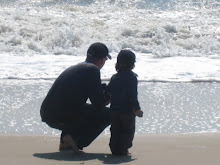One note I almost always get on my stuff is about one of the Golden Rules: don’t write anything in action description that doesn’t correspond directly to what the viewer will be seeing on screen.
Not a bad guideline, I agree, but definitely not an essential rule.
I think the rule came into being to help budding screenwriters remember that although the script is written on paper, it’s written for a visual medium. So always think of what it’s gonna look like and relay that. Of course. Absolutamente.
But I think two overriding guidelines are 1) we should enjoy the writing of the thing while making sure readers enjoy the reading of it, and 2) we should trust readers to do a little work themselves.
It’s difficult and lonely work, writing, so we need to have some fun doing it. I mean, come on, not all of us are getting rich off it. Give us something. Also,it’s boring to read a million screenplays as anyone in the business has to do, so readers should take some enjoyment out of it, too.
I’ve heard directors and actors complain about screenplays spelling things out too much for them, not allowing them to draw conclusions, make imaginative leaps, have a brain. You can in fact describe a physical condition without stating it too literally.
I mean think about it: when you’re watching a movie and there’s a bunch of clunky exposition, doesn’t it annoy you as a viewer? You’re sitting there rolling your eyes thinking, “Okay, thanks, I get it. Let’s move on.”
Same thing a reader thinks, I think, when everything is laid out too literally in a script.
I was reading the script for American Gangster recently. A couple of examples from it, courtesy of Steven Zaillian. The first regarding the fact that writers should have some fun writing and readers should enjoy the read:
Bumpy stops before a display of cameras and stares in. They’re all pointed at him as a pain grips his chest and he sinks to his knees. Frank kneels down.
FRANK
What is it?
Bumpy seems unable to speak, looks to Frank confused.
FRANK
Somebody call an ambulance!
But the store suddenly seems empty. Frank yells into the emporium but can’t be heard above the Muzak and the cash registers ringing up sales Bumpy will never see a piece of. Looking up at Frank, Bumpy manages weakly –
BUMPY
Forget it, Frank. No one’s in charge.
Nice, right? Now, you can’t exactly see “ the cash registers ringing up sales Bumpy will never see a piece of” but, as a reader, don’t you appreciate the artfulness of it? Isn’t it a better way of saying Bumpy’s about to die and his extortion days are over? And if you were Zaillian, wouldn’t you die of boredom and never write again if you couldn’t write like this?
Another example, a few pages later, regarding how description can actually be visual, without being too literally visual:
Richie lunges at him, hits him again with his injured hand - which hurts Richie more than it does Campizi. The paramedics manage to pull him away.
CAMPIZI
What can we do, Richie? You don’t want
to do this. For old times sake, what can
we do? Who do you want? Who can I give
you? You want Big Sal’s bookie? You want
his accountant? I’ll give him to you.
Richie regards him a moment. A policy ring’s accountant wouldn’t be bad. He glances back to the paramedic dabbing at his bloody hand, and notices she’s not bad-looking. She smiles back.
Two things there. Some people might call Zaillian out on “which hurts Richie more than it does Campizi” and on “A policy ring’s accountant wouldn’t be bad.”
But I submit that those actually do reflect something that can be seen. You just have to do a little work. And I mean a little work –- it’s not hard.
True, the first one doesn’t read, “Richie screams and cradles his hand while Campizi barely whimpers” but you can see how those two actors would react to that punch, can’t you?
And the second one, to be more literal, could be something stupid like, “Richie raises his eyebrows, smiles slightly and nods his head” but that would be, well, stupid. You can see his reaction to the offer of the accountant. In his eyes you can see he’s considering the offer.
Come on, I know you can.

